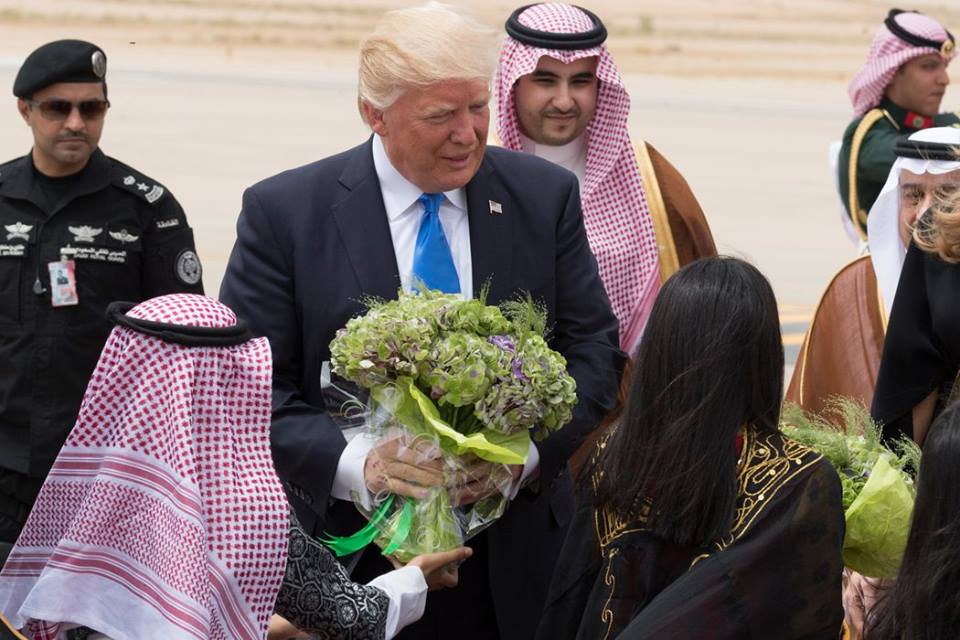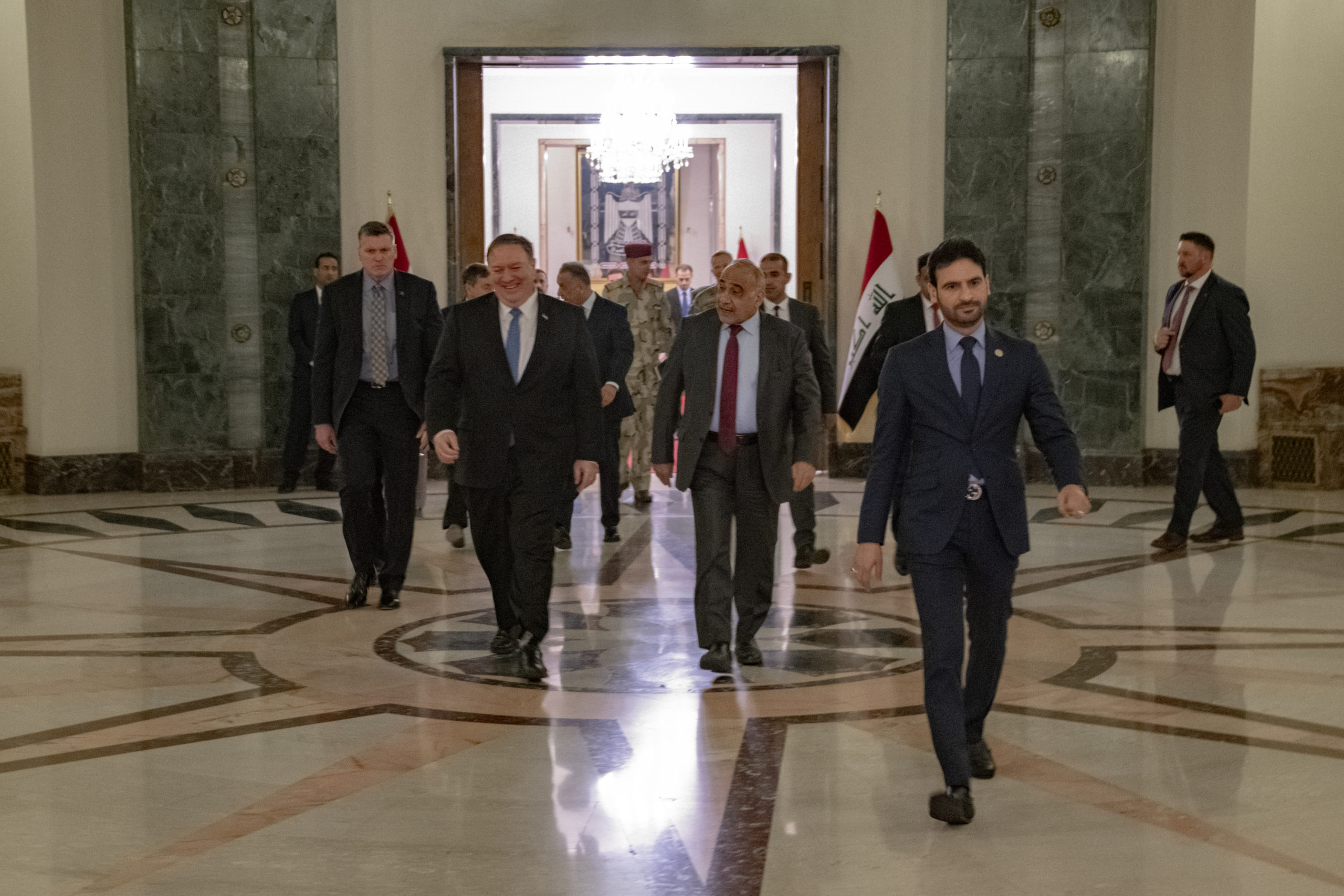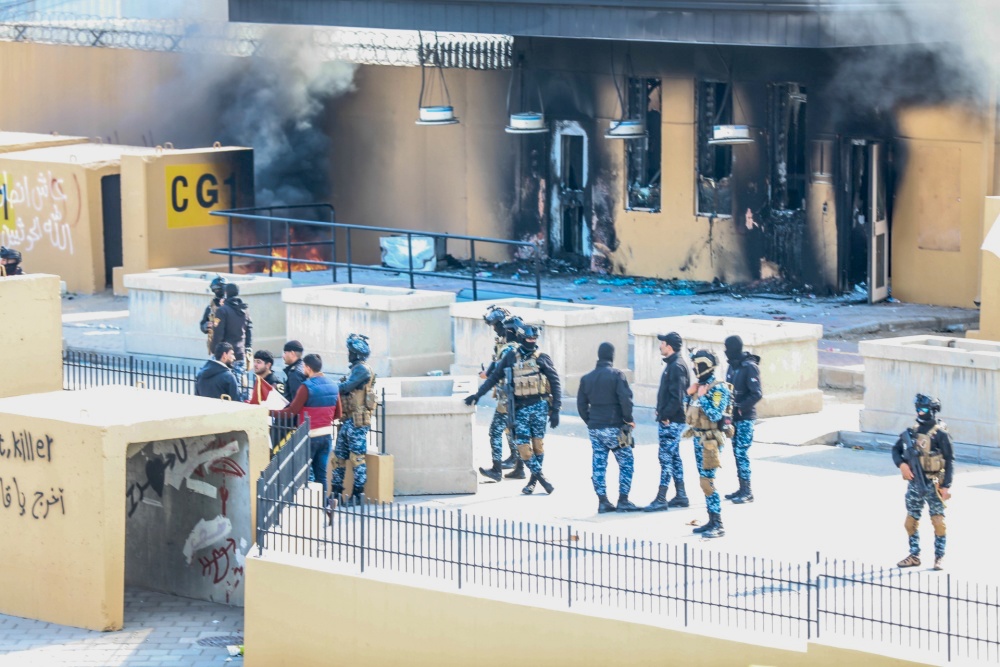The assassination of a top Iranian general reflects a U.S. foreign policy tied to Saudi interests, says Craig Murray.

President Donald Trump is welcomed with bouquets of flowers, May 20, 2017, on arrival at King Khalid International Airport in Riyadh, Saudi Arabia. (White House/Andrea Hanks)
By Craig Murray
CraigMurray.org.uk
 For the United States to abandon proxy warfare and directly kill one of Iran’s most senior political figures has changed international politics in a fundamental way. It is a massive error. Its ramifications are profound and complex.
For the United States to abandon proxy warfare and directly kill one of Iran’s most senior political figures has changed international politics in a fundamental way. It is a massive error. Its ramifications are profound and complex.
There is also a lesson to be learned in the excitement and satisfaction this caused in the palaces of Washington, Tel Aviv, Riyadh and Tehran. All of the political elites will see prospects for gain from the new fluidity. While for ordinary people in all those countries there is only the certainty of more conflict, death and economic loss, for the political elite, the arms manufacturers, the military and security services and allied interests, the hedge funds, speculators and oil companies, there are the sweet smells of cash and power.
Tehran will be pleased because the USA has just definitively lost Iraq. Iraq has a Shia majority and so naturally tends to ally with Iran. The only thing preventing that was the Arab nationalism of Saddam Hussein’s Ba’ath Socialist Party. U.S. President George W. Bush and U.K. Prime Minister Tony Blair were certainly fully informed that by destroying the Ba’ath system they were creating an Iranian/Iraqi nexus, but they decided that was containable. The “containment” consisted of a deliberate and profound push across the Middle East to oppose Shia influence in proxy wars everywhere.
This is the root cause of the disastrous war in Yemen, where the Zaidi-Shia would have been victorious long ago but for the sustained brutal aerial warfare on civilians carried out by the Western powers through Saudi Arabia. This anti-Shia Western policy included the unwavering support for the Sunni Bahraini autocracy in the brutal suppression of its overwhelmingly Shia population. And, of course, it included the sustained and disastrous attempt to overthrow the Assad regime in Syria and replace it with pro-Saudi Sunni jihadists.
‘The Redirection’
This switch in U.S. foreign policy was known in the White House of 2007 as “the redirection.” It meant that Sunni jihadists like Al-Qaida and later al-Nusra were able to switch back to being valued allies of the United States. It redoubled the slavish tying of U.S. foreign policy to Saudi interests. The axis was completed once Mohammad Bin Salman took control of Saudi Arabia. His predecessors had been coy about their de facto alliance with Israel. MBS felt no shyness about openly promoting Israeli interests, under the cloak of mutual alliance against Iran, calculating quite correctly that Arab street hatred of the Shia outweighed any solidarity with the Palestinians. Common enemies were easy for the USA/Saudi/Israeli alliance to identify; Iran, the Houthi, Syria’s PresidentBashar al-Assadand of course the Shia Hezbollah, the only military force to have given the Israelis a bloody nose. The Palestinians themselves are predominantly Sunni and their own Hamas was left friendless and isolated.

U.S. Secretary of State Michael R. Pompeo meets with Iraqi Prime Minister Adil Abdul-Mahdi, Baghdad, May 7, 2019. (State Department/ Ron Przysucha)
The principal difficulty of this policy for the U.S. of course is Iraq. Having imposed a rough democracy on Iraq, the governments were always likely to be Shia dominated and highly susceptible to Iranian influence. The U.S. had a continuing handle through dwindling occupying forces and through control of the process which produced the government. They also provided financial resources to partially restore the physical infrastructure the U.S. and its allies had themselves destroyed, and of course to fund a near infinite pool of corruption.
That U.S. influence was balanced by strong Iranian-aligned militia forces who were an alternative source of strength to the government of Baghdad, and of course by the fact that the center of Sunni tribal strength, the city of Falluja, had itself been obliterated by the United States, three times, in an act of genocide of the Iraqi Sunni population.
Through all this the Iraqi Prime Minister Adil Abdul-Mahdi had until now tiptoed with great care. Pro-Iranian, yet a long-term American client, his government maintained a form of impartiality based on an open hand to accept massive bribes from anybody. That is now over. He is pro-Iranian now.
Precarious Balance
Such precarious balance as there ever was in Iraq was upset these last two months when the U.S. and Israelis transported more of their ISIL Sunni jihadists into Iraq, to escape the pincer of the Turkish, Russian and Syrian government forces. The Iranians were naturally not going to stand for this and Iranian militias were successfully destroying the ISIL remnants, which is why General Qassem Suleimani was in Iraq, why a U.S. mercenary assisting ISIL was killed in an Iranian militia rocket attack, and why Syrian military representatives were being welcomed at Baghdad airport.

Second day of protests at U.S. embassy in Baghdad, Jan. 1, 2020. (Desmond Cassell, Wikimedia Commons)
It is five years since I was last in the Green Zone in Baghdad, but it is extraordinarily heavily fortified with military barriers and checks every hundred yards, and there is no way the crowd could have been allowed to attack the U.S. embassy without active Iraqi government collusion. That profound political movement will have been set in stone by the U.S. assassination of Iran’s General Qassem Suleimani. Tehran will now have a grip on Iraq that could prove to be unshakable.
Nevertheless, Tel Aviv and Riyadh also celebrated the idea that their dream of the U.S. destroying their regional rival Iran, as Iraq and Libya were destroyed, is coming closer. The U.S. could do this. The impact of technology on modern warfare should not be underestimated. There is a great deal of wishful thinking that fantasizes about U.S. military defeat, but it is simply unrealistic if the U.S. actually opted for full scale invasion. Technology is a far greater factor in warfare than it was in the 1960s. The U.S could destroy Iran, but the cost and the ramifications would be enormous, and not only the entire Middle East but much of South Asia would be destabilized, including of course Pakistan. My reading of President Donald Trump remains that he is not a crazed Clinton type war hawk and it will not happen. We all have to pray it does not.
The assassination also caused rejoicing in Washington. There is nothing like an apparently successful military attack in a U.S. re-election campaign. The Benghazi embassy disaster left a deep scar upon the psyche of Trump’s support base in particular, and the message that Trump knows how to show the foreigners not to attack America is going down extremely well where it counts, whatever wise people on CNN may say.
So, what happens now? Consolidating power in Iraq and finishing the destruction of ISIL in Iraq will be the wise advance that Iranian statesman can practically gain from these events. But that is, of course, not enough to redeem national honor. Something quick and spectacular is required for that. It is hard not to believe there must be a very real chance of action being taken against shipping in the Straits of Hormuz, which Iran can do with little prior preparation. Missile attacks on Saudi Arabia or Israel are also well within Iran’s capability, but it seems more probable that Iran will wish to strike a U.S. target rather than a proxy. An ambassador may be assassinated. Further missile strikes against U.S. outposts in Iraq are also possible. All of these scenarios could very quickly lead to disastrous escalation.
In the short term, Trump in this situation needs either to pull out troops from Iraq or massively to reinforce them. The U.K. does not have the latter option, having neither men nor money, and should remove its 1400 troops now. Whether the “triumph” of killing Suleimani gives Trump enough political cover for an early pullout — the wise move — I am unsure. 2020 is going to be a very dangerous year indeed.
Craig Murray is an author, broadcaster and human rights activist. He was British ambassador to Uzbekistan from August 2002 to October 2004 and rector of the University of Dundee from 2007 to 2010.
This article is from CraigMurray.org.uk.
The views expressed are solely those of the author and may or may not reflect those of Consortium News.
Please Donate to the Winter Fund Drive.
Before commenting please read Robert Parry’s Comment Policy. Allegations unsupported by facts, gross or misleading factual errors and ad hominem attacks, and abusive or rude language toward other commenters or our writers will not be published. If your comment does not immediately appear, please be patient as it is manually reviewed. For security reasons, please refrain from inserting links in your comments, which should not be longer than 300 words.

But, how about the Israeli allegiance of the USA? Wasn’t that the main driver, rather than Saudi allegiance?
There was a deal made in 2002 between Israel (and their Neocon supporters in the US) and Saudi Arabia, in order to get the Saudis to join the Iraq war coalition. The deal was to do regime change in Iran and Syria after Saddam was removed in Iraq. That is what the Saudis demanded in exchange for the Iraq war to proceed, being aware of the the likelihood that Iraq would become dominated by Shia.
General Wesley Clark says he saw the evidence of this grand bargain in a video circulated widely on YouTube:
www(dot)youtube(dot)com/watch?v=SXS3vW47mOE
Israel and their Neocon corner, must now complete their part of the bargain.
Here is probably what happened in 2002 in a deal worked out by Dick Cheney:
The Iraq war, and removal of Saddam, would have been impossible unless the Saudis agreed to it in advance. Therefore, in 2002 Saudi Arabia (Prince Bandar) was shown a list of seven countries where the neocons (Zionists) wanted to do regime change.This is the same list that General Wesley Clark later spoke about seeing. The Saudis agreed that, in exchange for the high probability that, after the war, Iraq would be taken over by the Shiites, there would be regime change in both Iran and Syria to compensate the Saudi’s.
I see more of Bibi’s bloody fingerprints than the article indicates. He too has legal troubles that need a good distraction, and he, not Putin, is the chief puller of Trump’s strings.
I wonder if Trump is smart enough to understand the ramifications that Mr. Murray describes. I doubt it. I think he is being played, and that his own ego is his only major concern.
Most of the MAGA crowd will defend Trump no matter what happens. And presidents who are at war usually get re-elected. The smart move of pulling out of Iraq isn’t even a possibility; the MIC, its “Intelligence” agency vassals, and the real rulers of Empire would never allow it. As long as there aren’t too many American casualties on the ground, the sheeple will stay hypnotized by their TV sets. The trick for the war hawks will be how to get control of the oil without igniting WWIII.
The real question is will the US have outposts in Iraq for Iran to hit. The US and its vassals have already been put on notice that they will be uninvited in Iraq. The US can, and probably will, tell the puppet government in Iraq to go piss up a rope. But that will bring in a whole different set of players and redistribute the pieces.
As for your “The impact of technology on modern warfare should not be underestimated.” Tell that to the Taliban.
Craig’s reference to “why a U.S. mercenary assisting ISIL was killed in an Iranian militia rocket attack” appears to refer to the contractor killed December 27,and would tie to the official rationale/pretext at this time being echoed by Trump and MSM.
As reported by MSM press (Reuters for example) the decision to destroy Soleimani and his escort devolved from a strategy meeting in October, subsequently ratted out by informant(s) at that meeting, to attack US bases and use rockets against US helicopters.
This is what Trump has referred to. And of course what led to the chain of events we’ve witnessed since.
In short, what is implied here by this brief reference is that Suleimani’s plan was to target US bases assisting ISIL forces, thus continuing his fight against ISIS, and what had taken him to huge popularity in the region. This adds perspective to the pentagon’s rationale on why he was torched, plus adds to why the region is so enraged.
It also suggests that this pretext is deliberately calculated (despite all the deaths, including of US forces) to force Iran to respond and provide the further pretext to do a shock and awe invasion in Iran a la Iraq 2003.
Hence to a new consortium of international corporations feeding vulture-like on Iran resources, as with Iraq.
For MSM coverage of the official story and betrayal of Soleimani, search under key words “inside plot iran Soleimani attack”.
That would great if he pulled out the troops and clamed victory but I’m afraid the trumpster will double down.
This time things would change definitely with precarious consequences for the United States, it allies and all the region at large. Because it will be quit grave if Iran should let go this maglinity and try to save face by fumbling about with so called friends to find favor.
Also, one hard thing the Iranians should learn is the fact that their menace will not end with the present situation they face nor will the western assertion of Iran as the world’s state sponsor of terror be done with whiles Israel is not finished with it gobbling.